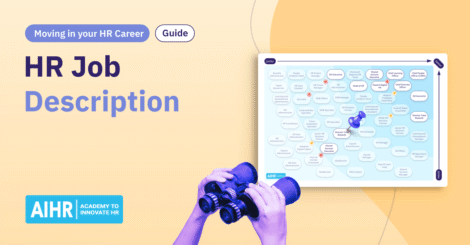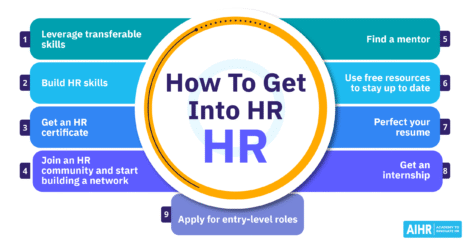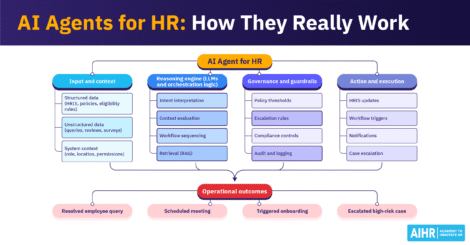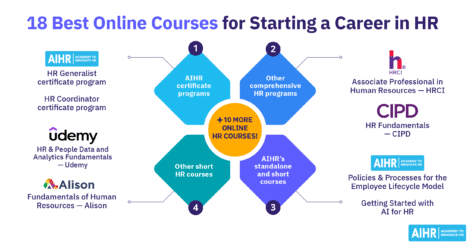The Training Facilitator is responsible for designing, developing, and implementing agreed training programs. They manage the training sessions of employees, including outlining training objectives, preparing the facility and resources, and ensuring all participants are present.
Contents
Role family, salary range & work experience
Key responsibilities
Skills & competencies
Job description template
Detailed responsibilities & tasks
KPIs for this role
Training programs
Role family, salary range & work experience
- HR role family: Solution architect
- Salary range: 49,000 – 60,000
- Work experience: 1–3 years
Key responsibilities
- Schedule and facilitate a variety of programs ranging from one hour to multi-day programs conducted in a classroom or online learning environment, which may include skill development training, professional development, and management and leadership training programs.
- Support the development of new training and/or evolve existing training offerings, as well as deliver existing materials and add context/content/background to course delivery.
- Work with subject matter experts, instructional design teams, talent consultants and training specialists to deliver programs that support business capability for the organization.
- Monitor and evaluate training effectiveness, and make recommendations for improvements as needed.
Skills & competencies
- Analytics Translation
- Business Advisory/Partnering/Generalist
- Change Navigation
- Delivers through Technology
- Drives Results
- Engages People
- L&D/Leadership Development
- Talent and Performance Management
Job description template: Training Facilitator
The Training Facilitator is responsible for designing, developing and delivering effective training programs for employees within the organization. The role requires excellent communication and interpersonal skills to facilitate training sessions and engage with participants, ensuring they acquire the necessary knowledge and skills to meet their job requirements.
Responsibilities:
- Design, develop and deliver training programs to meet the needs of employees within the organization.
- Conduct training needs assessments to identify knowledge and skills gaps, and develop appropriate training programs to address them.
- Collaborate with subject matter experts and other stakeholders to ensure training content is relevant, accurate and up-to-date.
- Create and maintain training materials, including presentations, handouts, and e-learning modules.
- Deliver training sessions in a variety of formats, including classroom-based sessions, virtual instructor-led training, and e-learning modules.
- Monitor and evaluate training effectiveness, and make recommendations for improvements as needed.
- Provide feedback and coaching to participants to ensure they are able to apply the knowledge and skills they have acquired.
- Maintain records of training activities, including attendance records and evaluations.
- Stay up-to-date with emerging trends and best practices in training and development.
Requirements:
- Bachelor’s degree in Training and Development, Human Resources, Education, or a related field.
- Proven experience in designing and delivering effective training programs.
- Strong presentation and facilitation skills, with the ability to engage participants and deliver training in a variety of formats.
- Excellent communication and interpersonal skills, with the ability to build strong relationships with stakeholders.
- Strong project management skills, with the ability to manage multiple projects simultaneously.
- Knowledge of adult learning principles and instructional design methodologies.
- Proficiency in using e-learning software and other training tools.
- Strong analytical and problem-solving skills.
- Ability to work both independently and as part of a team.
- Strong attention to detail and accuracy.
Detailed responsibilities & tasks
- Design, develop and deliver training programs to meet the needs of employees within the organization.
- Conduct training needs assessments to identify knowledge and skills gaps, and develop appropriate training programs to address them.
- Collaborate with subject matter experts and other stakeholders to ensure training content is relevant, accurate and up-to-date.
- Create and maintain training materials, including presentations, handouts, and e-learning modules.
- Deliver training sessions in a variety of formats, including classroom-based sessions, virtual instructor-led training, and e-learning modules.
- Monitor and evaluate training effectiveness, and make recommendations for improvements as needed.
- Provide feedback and coaching to participants to ensure they are able to apply the knowledge and skills they have acquired.
- Maintain records of training activities, including attendance records and evaluations.
- Stay up-to-date with emerging trends and best practices in training and development.
Detailed skills description
- Strong communication skills: A Training Facilitator must be able to clearly and effectively communicate complex information to learners.
- Knowledge of adult learning principles: A good Training Facilitator understands how adults learn best and can structure training sessions that are engaging and effective.
- Flexibility and adaptability: A Training Facilitator should be able to adapt to the needs of different learners and adjust their approach to meet those needs.
- Organizational skills: A Training Facilitator must be able to plan and organize training sessions and materials effectively.
- Interpersonal skills: A Training Facilitator must be able to build strong relationships with learners, stakeholders, and colleagues.
- Problem-solving skills: A Training Facilitator should be able to identify and solve problems that arise during training sessions.
- Technical skills: A Training Facilitator should be familiar with the technology and tools used in training sessions, such as presentation software, learning management systems, and virtual meeting platforms.
- Creativity: A Training Facilitator should be able to think creatively and come up with innovative approaches to training that engage and inspire learners.
- Passion for learning: A good Training Facilitator is passionate about learning and committed to helping others develop their skills and knowledge.
- Ability to provide constructive feedback: A Training Facilitator should be able to provide learners with constructive feedback that helps them improve their performance.
KPIs for this role
- Training effectiveness: This includes measuring the impact and effectiveness of the training sessions delivered by the facilitator, such as through assessments, feedback surveys, or other evaluations.
- Participant engagement and satisfaction: The facilitator’s ability to engage and motivate participants is important to ensure they are able to learn and retain new information. Satisfaction surveys can also help determine whether participants found the training valuable and relevant.
- Time management: The ability to manage time effectively during training sessions, ensuring all content is covered within the allotted time frame.
- Adapting to learner needs: Being able to adjust the delivery and content of training to meet the needs of different learners, including those with diverse backgrounds and learning styles.
- Continuous improvement: A commitment to ongoing professional development and improvement, as well as staying up-to-date with the latest training techniques and technologies.
Training programs
- Learning & Development Certificate Program
- Diversity, Equity, Inclusion & Belonging Certificate Program
- Organizational Development Certificate Program















